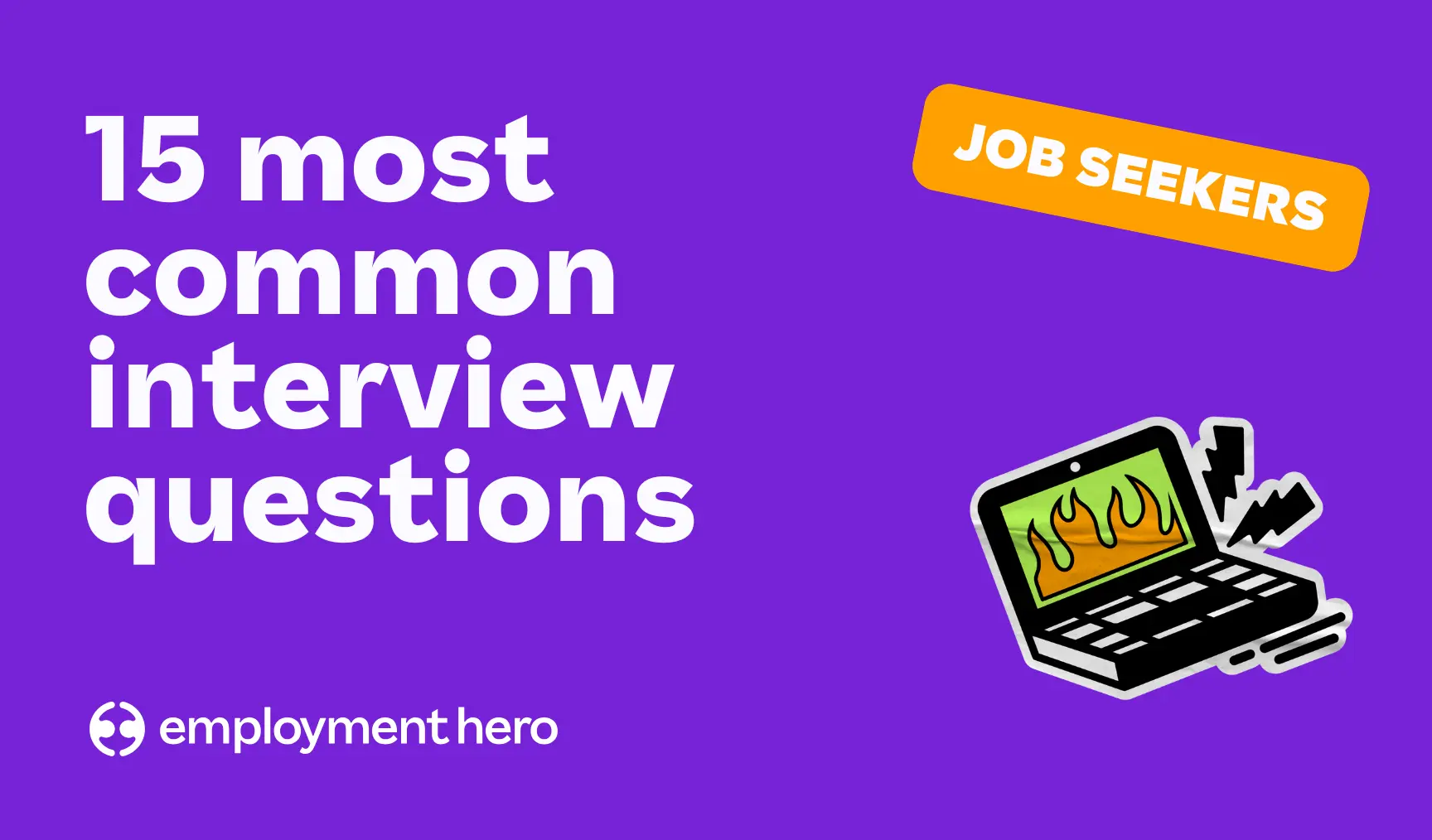15 common job interview questions in NZ (with answers)
Preparing for a job interview in New Zealand? Knowing what to expect is the first step toward mastering the process. Highlighting a balance of technical skills, teamwork and adaptability can help you excel in your next interview.

Contents
Preparing for a job interview in New Zealand? Knowing what to expect is the first step toward mastering the process. Highlighting a balance of technical skills, teamwork and adaptability can help you excel in your next interview.
Below we explore 15 of the most common job interview questions in New Zealand, with sample answers and strategies to help you leave a strong impression. Plus, we cover essential NZ interview tips to feel prepared, confident and ready to stand out.
Why preparing for interview questions matters in NZ
Anticipating common questions allows you to:
- Remain calm under pressure: Preparation leads to confidence, which lets your personality shine.
- Show how you’ll add to the team culture: Kiwi workplaces often prioritise teamwork and connection. Tailor your examples to demonstrate these qualities.
- Deliver tailored responses: Highlight experiences that align with the company’s goals and values.
- Stand out professionally: Clear and well-practiced answers immediately signal preparedness and professionalism.
The 15 most common job interview questions in NZ
1. Tell me about yourself
This classic opener can stump a lot of people. Where do you begin? Keep your response structured and relevant and try to provide more context than what’s on your resume:
Example answer:
“I have a background in logistics with eight years of experience managing supply chain projects across New Zealand. My key achievement was implementing an inventory system that streamlined stock management, cutting delays by 25%. I’m passionate about continuous improvement and now seek to apply my expertise in a larger organisation with a focus on sustainability.”
2. What do you know about our organisation?
Employers value genuine interest. Research their website, LinkedIn or recent news coverage.
Example answer:
“I understand that you prioritise innovative solutions for the agriculture sector. I noticed your recent partnership with X to improve sustainability practices. The way you integrate cultural values into business strongly resonates with my own approach.”
3. What interests you about this position?
Tie your interest in the role to personal passions and business goals.
Example answer:
“This role combines my marketing skills with your organisation’s focus on community growth. I was particularly drawn to how you support small New Zealand businesses, and I’d love to contribute by driving engagement through creative campaigns.”
4. How is your previous experience relevant to this role?
Reference specific achievements that align with the job’s requirements.
Example answer:
“In my five years as a content manager, I planned and executed campaigns that increased web traffic by 40%. Your advertised role mentions the need for strategy-driven communication, which matches my skills perfectly.”
5. Why did you leave your previous role?
Keep it positive and focus on growth.
Example answer:
“After five years at my previous company, I was ready for a fresh challenge where I could expand my responsibilities and gain exposure to a larger market. Your organisation represents the exact next step I’m looking for.”
6. What are your strengths?
Pick strengths that reflect what the job requires. Keep the personal strengths like your weekly pottery class or your rugby career stories for the team socials (unless you’re interviewing for the All Blacks).
Example answer:
“My top strength is relationship-building. Collaborating with diverse teams at my previous job helped me foster open communication, which streamlined project timelines and bolstered efficiency.”
7. What is your greatest weakness?
Turn a potential weakness into an example of growth and adaptability.
Example answer:
“In the past, I struggled with public speaking. To address this, I joined a local Toastmasters group and have since become confident presenting in team meetings and external events.”
8. What is your preferred work or management style?
Align your answer with evidence of adaptability and teamwork.
Example answer:
“I enjoy an inclusive work environment that values diverse input but also appreciates clear direction. Having worked on collaborative projects with varied stakeholders, I thrive in cultures that emphasize teamwork while setting measurable goals.”
9. What are your salary expectations?
Be flexible but informed. Research average wages using NZ-specific resources to gauge expectations for location and industry.
Example answer:
“Based on market research and the role requirements, I consider $75,000–$85,000 an appropriate range. I’m open to a discussion to ensure mutual alignment.”
10. Describe a time you showed leadership
Leadership doesn’t always mean management. Highlight teamwork and initiative.
Example answer:
“While redeveloping a workplace safety protocol, I noticed skill gaps among the team. I initiated training sessions, which led to a 30% improvement in reporting compliance within six months.”
11. How do you handle stress and pressure?
Keep your answer practical and realistic.
Example answer:
“When under pressure, I prioritize tasks and communicate updates to prevent bottlenecks. During a tight deadline last year, I introduced a shared task tracker that helped the team keep on schedule without feeling overwhelmed.”
12. How would you handle conflict in the workplace?
Kiwi managers often value harmony and problem-solving. Show neutrality and a solution-focused approach.
Example answer:
“I believe most conflicts stem from misunderstandings. Recently, when two team members disagreed on project priorities, I facilitated a discussion to clarify goals and align their focus, enabling us to finish ahead of schedule.”
13. Where do you see yourself in five years?
Highlight your ambition while demonstrating alignment with their objectives. They’re not expecting you to stay forever, but they will want to know your ambitions and futures are aligned.
Example answer:
“In five years, I hope to have added measurable value to my team by leading more complex projects. My goal is to take on strategic responsibilities that support the larger goals of your organisation.”
14. Tell me about a challenge you overcame
Use the STAR (Situation, Task, Action, Result) method to structure your example.
Example answer:
“In my last role, delivery delays impacted client satisfaction (Situation). I restructured supply chains by engaging local courier partners (Task). This action improved on-time deliveries by 50% within three months (Result).”
15. Do you have any questions for us?
Good questions show interest and engagement. You can also throw in a few fun ones like asking how the team connects socially or whether pets visit the office.
Example pre-prepared questions:
- “What career development opportunities do you offer?”
- “How does the team celebrate successes?”
- “How do you support diversity in your workplace?”
Behavioural interview questions: what to expect and how to prepare
Behavioural questions allow employers to observe your thought process in action, offering insight into how you approach scenarios rather than simply recounting past achievements.
Using the STAR method to structure your answers
Responding to behavioural questions can be tricky if you’re not prepared. The STAR technique is often used by job seekers to prepare for clear, concise responses:
- Situation: Briefly describe the scenario.
- Task: Explain your responsibility in the scenario.
- Action: Outline the steps and skills applied.
- Result: Highlight the outcome.
Using STAR ensures your responses stand out with clarity. Ahead of your interview, think of a few common scenarios or challenges you’ve come across in previous roles and use the STAR method to explain your approach and results.
How to handle tough or unexpected questions
Firstly, maintain composure. The interviewer is likely observing your reaction, thought process, and adaptability when presenting a challenging question. To gain time, you can ask for clarification, such as “Could you elaborate on that?” or “Could you clarify what you mean by X?”.
If you are genuinely unsure or lack a relevant example, you can briefly acknowledge this and then outline a hypothetical solution to the problem.
Example response for tough questions:
“That’s a new challenge for me, but I’d begin by researching the topic thoroughly and reaching out to industry peers for input.”
NZ interview success tips
- Punctuality is key: Arrive 10 minutes early. Lateness is often seen as disrespectful.
- Dress business-casual: NZ workplaces generally prefer a polished yet relaxed look.
- Collaborative mindset: Prepare examples that focus on teamwork and adaptability.
- Learn cultural contexts: Integrate an appreciation for NZ’s bicultural environment where suitable.
- Online preparation for virtual interviews: Test tech, ensure a professional video backdrop, and maintain good lighting.
What to do after the interview
- Send a polite thank-you email within 24 hours.
- Reflect on your performance and identify areas for improvement.
- Connect with your interviewer on LinkedIn, if appropriate.
Preparation and enthusiasm are key to succeeding in the unique professional environment of New Zealand. Practice, research and confidence will guide you toward your next opportunity.
Looking for your next job? Start searching for jobs and create your profile to let the best jobs find you. Your career success starts here!
Related Resources
-
 Read more: Candidate engagement: Strategies to improve your hiring process
Read more: Candidate engagement: Strategies to improve your hiring processCandidate engagement: Strategies to improve your hiring process
Learn how businesses can build a positive candidate engagement experience.
-
 Read more: Building a strong talent pipeline: Strategies for recruiting and developing future leaders
Read more: Building a strong talent pipeline: Strategies for recruiting and developing future leadersBuilding a strong talent pipeline: Strategies for recruiting and developing future leaders
Learn how to recruit, develop, and retain quality employees who can become future leaders.
-
 Read more: 13 Creative Talent Sourcing Strategies to Expand your Talent Pool
Read more: 13 Creative Talent Sourcing Strategies to Expand your Talent Pool13 Creative Talent Sourcing Strategies to Expand your Talent Pool
Recruitment favours the proactive. Here’s how to refresh your talent sourcing strategy for 2023.





















